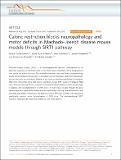Caloric restriction blocks neuropathology and motor deficits in Machado–Joseph disease mouse models through SIRT1 pathway
Author(s)
Cunha-Santos, Janete; Duarte-Neves, Joana; Carmona, Vitor; Pereira de Almeida, Luís; Cavadas, Cláudia; Guarente, Leonard Pershing; ... Show more Show less
DownloadGuarente_Caloric restriction blocks.pdf (2.356Mb)
PUBLISHER_CC
Publisher with Creative Commons License
Creative Commons Attribution
Terms of use
Metadata
Show full item recordAbstract
Machado–Joseph disease (MJD) is a neurodegenerative disorder characterized by an abnormal expansion of the CAG triplet in the ATXN3 gene, translating into a polyglutamine tract within the ataxin-3 protein. The available treatments only ameliorate symptomatology and do not block disease progression. In this study we find that caloric restriction dramatically
rescues the motor incoordination, imbalance and the associated neuropathology in transgenic MJD mice. We further show that caloric restriction rescues SIRT1 levels in transgenic MJD mice, whereas silencing SIRT1 is sufficient to prevent the beneficial effects on MJD pathology.
In addition, the re-establishment of SIRT1 levels in MJD mouse model, through the gene delivery approach, significantly ameliorates neuropathology, reducing neuroinflammation and activating autophagy. Furthermore, the pharmacological activation of SIRT1 with resveratrol
significantly reduces motor incoordination of MJD mice. The pharmacological SIRT1 activation could provide important benefits to treat MJD patients.
Date issued
2016-05Department
Massachusetts Institute of Technology. Department of Biology; Paul F. Glenn Center for Biology of Aging Research (Massachusetts Institute of Technology); Koch Institute for Integrative Cancer Research at MITJournal
Nature Communications
Publisher
Nature Publishing Group
Citation
Cunha-Santos, Janete et al. “Caloric Restriction Blocks Neuropathology and Motor Deficits in Machado–Joseph Disease Mouse Models through SIRT1 Pathway.” Nature Communications 7 (2016): 11445.
Version: Final published version
ISSN
2041-1723